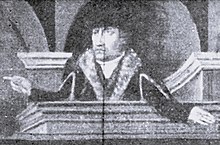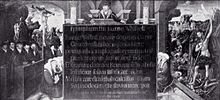Johann Walhoff
Johann Walhoff (* 1495 in Lübeck ; † 1543 ibid) was a German reformer .
Education
Walhoff began studying at the University of Rostock in April 1513 , which he completed with the academic degree of a Bachelor of Theology . Already during his studies he held a vicarie at the Marienkirche in Lübeck in 1514 . After his return to Lübeck, he held the office of chaplain at this church .
Act as a reformer
1528
In March 1528, Walhoff held Lutheran- influenced sermons and threatened the cathedral chapter with his resignation if this preaching activity was not additionally rewarded. Since Walhoff was a clergyman who was extremely popular with his community and who feared unrest if he resigned, Walhoff's wishes were granted.
In April of the same year Walhoff took over the representation of his Lutheran comrade Andreas Wilms as cathedral preacher during his trip to Wittenberg . After Wilms' return, from then on Walhoff was also met with distrust by the Lübeck Cathedral Chapter and the council . Together with Wilms, he was admonished to abstain from Lutheran remarks in his sermons in the future. On August 2nd, however, Walhoff gave an openly Lutheran sermon in St. Mary's Church and thus attracted a considerable number of Lutherans. The council and chapter then began to discuss the removal of Walhoff. The news of this project provoked ominous unrest in the population, so that Walhoff himself expressly urged obedience to the authorities in a sermon on August 23; in the afternoon sermon of the same day, however, he sharply attacked the church and its doctrines and customs, which were perceived as erroneous. These and the following similar statements made him an incalculable risk factor in the eyes of the council and cathedral chapter, but because of his popularity people still shy away from dismissal.
It was not until December 30th, after he had given another Lutheran sermon in St. Mary's Church, that the council and Bishop Bockholt agreed to withdraw Walhoff's permission to preach and to give him leave of absence.
1529
In the spring, Walhoff left Lübeck and went to Kiel , where reliable Lutheran preachers were needed after Melchior Hofmann's expulsion .
After his departure, Lutherans in Lübeck demanded his rehabilitation and recall. The Lübeck Singekrieg of the following months also represented a protest statement with which the citizens expressed their displeasure and demanded the return of Wilms and Walhoff. The council and the church, whose position became increasingly uncertain as more and more citizens and clergy professed their support for Lutheranism, finally gave in to the pressure on December 18 and called Walhoff back to Lübeck at the same time as Wilms, with the condition that he would give his sermons to avoid anything that could cause disagreement and turmoil . On the occasion of the recall, Martin Luther sent both of them a specially written pastoral letter in which he encouraged them in their work.
1530
On January 7, 1530, Johann Walhoff and Andreas Wilms were read out their appointment in the Lübeck town hall in the presence of a citizens' committee and all four mayors . At the same time, the detailed conditions under which they were to preach Lutheran from now on were announced to them. In particular, they were forbidden to make changes to the rites of the mass as long as the Reichstag, which advised on the admissibility of such innovations , had not come to a decision. The city council and clergy feared further unrest, especially due to masses held in German . These restrictions were not what the Lutheran congregations wanted. Nonetheless, Walhoff was now free, in his new position as preacher at St. Mary's, to largely openly proclaim Lutheran teaching. His and Wilms' sermons gave Lutheranism in Lübeck a considerable boost.
Together with Wilms, Walhoff used the changed situation to attract more clergymen to the side of Lutheranism. He forced new clerics appointed by the Church who refused to preach in an evangelical manner to give up their work or to leave the city by threatening them that they would otherwise sharply denounce them in his sermons. Walhoff also ignored the restrictions imposed; on May 1, for example, he and Wilms held mass in the cathedral entirely in German.
Walhoff's activities contributed to the fact that in the course of the year the council gradually gave up its initially clearly negative attitude towards the Lutheran doctrine and finally turned around during the negotiations with the majority Protestant citizenry when its previous position became untenable. On June 30, 1530, the Reformation was officially introduced in Lübeck by a council resolution.
Walhoff remained a Protestant preacher in St. Mary's Church until his death in 1543. The only known portrait, his epitaph , which was burned in 1942 in the Marienkirche in Lübeck, shows him in this capacity holding a sermon.
literature
- Wilhelm Jannasch: Reformation history of Lübeck from St. Peter's indulgence to the Augsburg Reichstag 1515-1530 . Max Schmidt-Römhild publishing house, Lübeck 1958
- Wolfgang Prange: Vicaries and vicars in Lübeck up to the Reformation . Schmidt-Römhild Verlag, Lübeck 2003. ISBN 3-7950-0478-0
Individual evidence
- ↑ Registration of Johann Walhoff in the Rostock matriculation portal
- ↑ Doctorate on Johann Walhoff's bachelor's degree in the Rostock matriculation portal
Web links
- Johannes Bugenhagen, Martin Luther: Letter to Andreas Wilms and Johann Walhoff in Lübeck (Wittenberg, January 12 or March 12, 1530) , digitized version of the Thuringian University and State Library in Jena
| personal data | |
|---|---|
| SURNAME | Walhoff, Johann |
| ALTERNATIVE NAMES | Walhoff, Johannes |
| BRIEF DESCRIPTION | German reformer |
| DATE OF BIRTH | 1495 |
| PLACE OF BIRTH | Lübeck |
| DATE OF DEATH | 1543 |
| Place of death | Lübeck |

